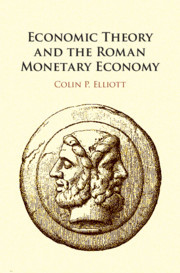Economic Theory and the Roman Monetary Economy
Langue : Anglais
Auteur : Elliott Colin P.

Reconceptualizes economic theory as a tool for understanding the Roman monetary system and its social and cultural contexts.
Modern economics tantalizes historians, promising them a set of simple verbal and mathematical formulas to explain and even retrospectively predict historical actions and choices. Colin P. Elliott challenges economic historians to rethink the way they use economic theory. Building upon the approaches of Max Weber, R. G. Collingwood, Ludwig von Mises and others, Elliott reconceptualizes economic theories such as the quantity theory of money and Gresham's law as heuristic constructs - constructs which help historians identify and understand the unique modes of thought and embedding contexts which characterized economic action in the Roman Empire. The book offers novel analyses of key events in Roman monetary history, from Augustus' triumph over Mark Antony and Cleopatra, to third-century AD coinage debasements. Roman history has long been a battleground for polarizing methodological debates, but this book's accessible style and conciliatory tone invites historians, economists, sociologists and other scholars to use economic theory for understanding.
1. On writing Roman economic history; 2. Embedding contexts of Roman money; 3. Evidence and theory; 4. Rationality, purposefulness and action; 5. The meanings of money quantity and quality; 6. Understanding money use and value.
Colin P. Elliott is an Assistant Professor in the Department of History at Indiana University, Bloomington. He has published interdisciplinary research on the economic, social and environmental history of the Roman Empire, and his next project explores intersections between its economy and the environment.
Date de parution : 02-2020
Ouvrage de 222 p.
15.6x23.4 cm
Thème d’Economic Theory and the Roman Monetary Economy :
© 2024 LAVOISIER S.A.S.



